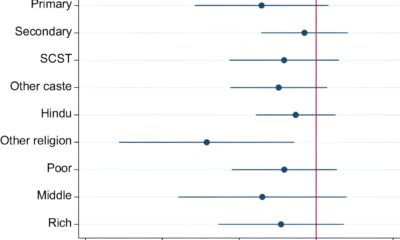Health
Socially connected older adults are being hit harder by the pandemic than isolated peers

Credit: Pixabay/CC0 public domain
Socially connected older people had a sharper decline in their quality of life and life satisfaction and a greater increase in loneliness than their more isolated counterparts during the pandemic, according to a new study from researchers at UCL (University College London).
The study, published in Proceedings of the National Academy of Sciences (PNAS), looked at survey responses from 4,636 people in England (with an average age of 67) between 2018 and the end of 2020.
Co-author Professor Andrew Steptoe from UCL’s Department of Behavioral Science & Health said: “You might expect that older people who were already socially isolated would be particularly vulnerable to the disruptions and restrictions of the pandemic.
“In fact, our study suggests the opposite: that isolated older adults were somewhat protected from the negative aspects of pandemic mitigation, perhaps because they had less to lose in terms of social connections.”
The researchers analyzed data from the English Longitudinal Study of Ageing, a nationally representative population survey in England. Participants were interviewed in 2018-2019 and twice in 2020: in June/July and November/December.
Just under a third (29%) of respondents were considered socially isolated, depending on the frequency of contact with friends and family, whether they lived with a partner and whether they participated in clubs, organizations or associations.
Before the pandemic, these socially isolated older adults had poorer quality of life and life satisfaction and greater loneliness, but in 2020 their decline in these areas was less pronounced than that of their more socially connected peers. Life satisfaction fell by about half, resulting in isolated older adults having similar life satisfaction during the pandemic as adults who were more socially connected.
Lead author Claryn Kung, senior researcher at UCL’s Department of Behavioral Science & Health, said: “It is likely that socially connected older men and women have experienced greater disruption to their usual routines and rhythms. In contrast, more isolated individuals may have experienced relatively fewer changes to their daily lives, with their usual routines and arrangements potentially less susceptible to disruptions from restrictions during the pandemic.
“Our findings highlight the need to care for isolated older adults, but also to be alert to the impact of major disruptions in social activity in times of crisis.”
In contrast to these effects, the study found that isolated adults experienced greater declines in physical activity, widening the gap between the two groups, and were still more likely to worry about their future finances. On average, they did not change their likelihood of using the Internet, while more socially connected peers used the Internet more often.
The study received support from the UK’s National Institute for Health and Social Care Research (NIHR) and the Economic and Social Research Council (ESRC), as well as the US National Institute on Aging.
More information:
Claryn SJ Kung et al., Changes in the well-being of socially isolated older adults during the COVID-19 pandemic: an outcome-wide analysis, Proceedings of the National Academy of Sciences (2024). DOI: 10.1073/pnas.2308697121
Quote: Socially connected older adults hit harder by pandemic than isolated peers (2024, June 8) retrieved June 9, 2024 from https://medicalxpress.com/news/2024-06-socially-older-adults-harder-pandemic.html
This document is copyrighted. Except for fair dealing purposes for the purpose of private study or research, no part may be reproduced without written permission. The content is provided for informational purposes only.













